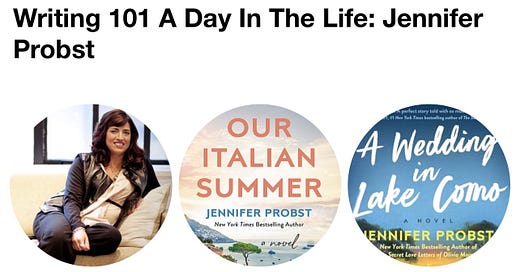Writing 101 A Day In The Life: Jennifer Probst
USA Today, Wall Street Journal & New York Times Bestselling Author Jennifer Probst has returned for Writing 101 A Day In The Life for Substack! I have had the pleasure of doing a Q&A and several Behind The Book Q&As with her for my blog. (Don’t worry I’m still going to do more Behind The Book Q&As with her for my blog 😉 ) .
Q: Jennfier, do you have a daily writing routine? How many hours a day do you spend plotting, writing and editing?
A: I try hard to write new words each day, but I also allow for flexibility when life happens! It’s easy to lose time doing endless admin but actually working on my books is when I feel the most satisfied about my use of time. I don’t do much plotting – and editing comes later after the first draft. 2K per day is ideal but many times, I’m happy with anything to move me forward.
Q: I know every author is different. Some authors are plotters & other authors are pansters meaning they write as they go along and discover the story as they write. Do you consider yourself a plotter or a panster?
A: I’m a definite pantser! I work with a very loose outline, and even secondary characters are written as I go. I like to discover the story as I write. I’ve always wanted to be a plotter instead but no matter how hard I try, my Muse freezes at any type of plotting software or sticky notes! I’ve made peace with my process now!
Q: Are there any tropes in the romance genre that you find tiresome that you try to avoid like the plague?
A: No, I find any trope can be written in a fresh, fun way depending on how the author sees it. That’s what’s so wonderful about the romance industry – there are endless ways to write a story, and each is unique.
Q: You’ve made it clear that you base your characters off people you know. I’m using this quote from our Q&A. Yes, I do. I always pay attention and am curious about everything – a must for a writer. I use my own traits and patterns, especially as they change as I grow older. I take from strangers, family, and friends, with real life situations, and then spin them into a fictional world. People are endlessly fascinating and exploring humanity and our relationships with love is a never-ending quest of mine. Out of all the novels and novellas you’ve written over the years, out of all the characters you’ve written, which ones do you relate to the most & why?
A: It will always be Alexa from The Marriage Bargain. She was most like me – her passion for rescue animals, love of books, love of the Mets, the positive outlooks, her fierce loyalty to her family. Since it was my first break out book, it makes sense – I wrote her from such a personal viewpoint!
Q: Jennifer, what is the most difficult part of the writing and editing process for you?
A: The first sixty percent of my rough draft. It’s usually hard. I start off with a bang, then it leaks away as I struggle to keep momentum, figure out who my characters really are, and put together a decent plot. But when I reach that magical point, I suddenly know everything and then I’m simply chasing the story, in my glory, and in love with writing. Each time it’s like magic! I don’t mind editing either. I get to take the raw form and shape, mold, and make it perfect.
Q: You’ve written several novels and novellas. Do you consider it easier to write a novel or a novella and why? In your opinion, does your book get easier or harder to write?
A: Every time I think a novella will be easier to write because it’s a shorter length, I’m shown differently! Each story needs the same dynamic – great characters, emotion, witty dialogue, a setting that makes the story pop, goal, motivation, conflict, etc.
Writing hasn’t become easier, even with fifty books behind me. What I do see is my faith in the process. Because I’ve done this over and over, my professionalism and confidence come out, and even when I’m stuck or in a bad place, I know I can get there because I’ve done it before. That’s why it’s so important to keep writing, book after book, it’s telling our Muse we got this! It’s trusting our unconscious creative mind.
Q: What is any writing advice you give to others that you struggle with yourself?
A: Don’t give up on yourself even when it’s hard. Even when people tell you it’s not worth it because the market sucks, and you’ll never sell, and things feel overwhelming. Trust in the story and what you have to say. When the brain wants to comment and insult, step away and notice, then go back to work. We are all human and struggle – that’s why our stories are so important
.




Thank you so much @Jennifer Probst for this amazing Writing 101 A Day In The Life Discussion!